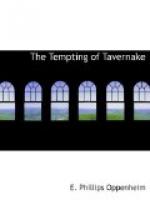“Well?” she asked.
“You looked very nice,” he said, slowly, as he led the way down the street. “Of course, I knew about your singing, but everything else—seemed such a surprise.”
“For instance?”
“Why, I mean your dancing,” he went on, “and somehow or other you looked different on the stage.”
She shook her head.
“‘Different’ won’t do for me,” she persisted. “I must have something more specific.”
“Well, then, you looked much prettier than I thought you were,” Tavernake declared, solemnly. “You looked exceedingly nice.”
“You really thought so?” she asked, a little doubtfully.
“I really thought so. I thought you looked much nicer than any of the others.”
She squeezed his arm affectionately.
“Dear Leonard,” she said, “it’s so nice to have you think so. Do you know, Mr. Grier actually asked me out to supper.”
“What impertinence!” Tavernake muttered.
Beatrice threw her head back and laughed.
“My dear brother,” she protested, “it was a tremendous compliment. You must remember that it was entirely through him, too, that I got the engagement. Four pounds a week I am going to have. Just think of it!”
“Four pounds a week is all very well,” Tavernake admitted. “It seems a great deal of money to earn like that. But I don’t think you ought to go out to supper with any one whom you know so slightly.”
“Dear prig! You know, you are a shocking prig, Leonard.”
“Am I?” he answered, without offence, and with the air of one seriously considering the subject.
“Of course you are. How could you help it, living the sort of life you’ve led all your days? Never mind, I like you for it. I don’t know whether I want to go out to supper with anybody—I really haven’t decided yet—but if I did, it would certainly be better for me to go with Mr. Grier, because he can do me no end of good at the theatre, if he likes.”
Tavernake was silent for several moments. He was conscious of feeling something which he did not altogether understand. He only knew that it involved a strong and unreasonable dislike to Mr. Grier. Then he remembered that he was her brother, that he had the right to speak with authority.
“I hope that you will not go out to supper with any one,” he said.
She began to laugh but checked herself.
“Well,” she remarked, “that sounds very terrible. Shall we take a ’bus? To tell you the truth, I am dying of hunger. We rehearsed for two hours before the performance, and I ate nothing but a sandwich—I was so excited.”
Tavernake hesitated a moment—he certainly was not himself this evening!
“Would you like to have some supper at a restaurant,” he asked, “before we go home?”
“I should love it,” she declared, taking his arm as they passed through a stream of people. “To tell you the truth, I was so hoping that you would propose it.”




